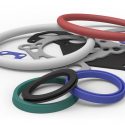Perhaps the most famous O-ring failure in history is that of the Challenger space shuttle, which ended the lives of seven NASA astronauts in January 1986. In the shuttle’s right rocket booster, a seal failed at the aft field joint that led to the spacecraft exploding. It was later found that the O-ring didn’t have… Read more »
How to Make an O-Ring Seal Better











